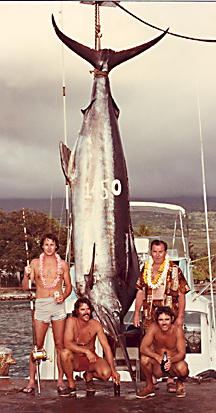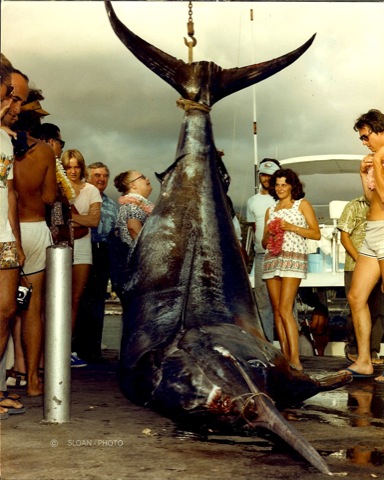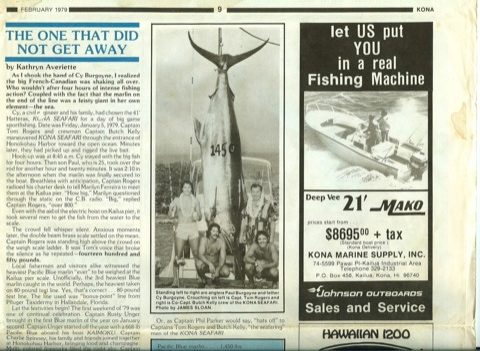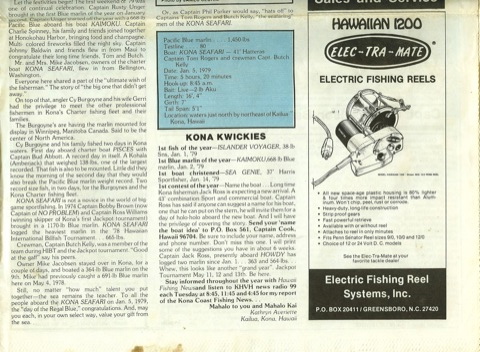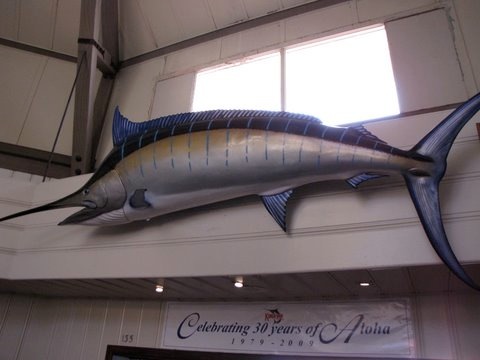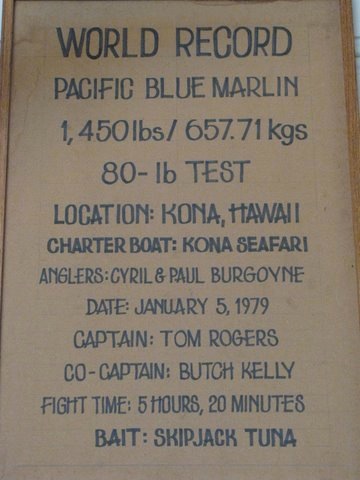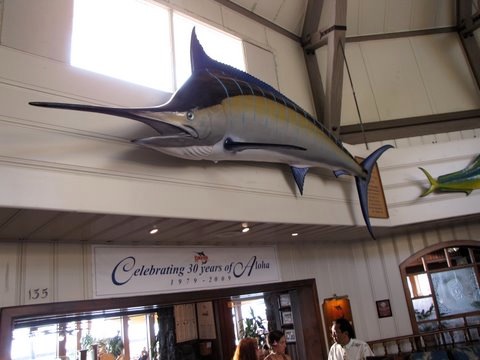Paul Burgoyne
Studio Gallery
1450 Pound Pacific Blue Marlin
I can stand in just about any room, stick one arm out in front of me and say, “I caught a fish this long”; however, I seldom have an opportunity to boast. First of all, most discussions about sport fishing arise among people whom I have just met, where someone is bragging about the 10-pound Pickerel or 40-pound King that he or she caught on a recent fishing trip. It seems to me that there is something immoral about steeling an angler’s thunder by announcing, “Well, I caught a 1450 pound…” so I bite my tongue. Such a revelation is just too profound to introduce into the conversation and it’s just as well.
When I tell the story I seldom have the courage to reveal the truth about my experience. If I told anyone that for many months following the trip, my emotional state more closely resembled PTSD than that of a triumphant fisherman, the conversation would have probably soured as they assessed my mental state. No one, especially an angler wants to hear that I experienced profound guilt for having caused the death of a fish – really, a fish? It flies in the face of my own sense of morality but having watched this immense creature fight for its life over an extended period, ended up being a traumatic experience for me personally.
I believe that most people visualize the experience as being similar to that of catching a lake fish but nothing could be further from the truth. One does not reel in a marlin, and simply scoop it from the water with a net. It is a long and agonizing process where the marlin may drag the vessel backwards for miles out to sea. All its pursuers can hope to do is slow the fish down reducing its oxygen intake. Marlin have been clocked at 50 mph making them the second fastest creatures in the sea, second only to the Sailfish. To put that into perspective, 50 mph is twice as fast as a boat needs to travel to pull a barefoot skier. If you can slow the fish down for long enough, it will eventually reach a point where its heart stops. I am not sure where fishing stopped and cruelty begins but at some point during the 5 hour and 20 minute ordeal, I felt we had crossed that line.
Most of the giant marlin that become hooked die during the battle and their bodies are never recovered. When a marlin is unable to escape it becomes disoriented and starts sounding. As the marlin goes ever deeper the line is being pulled straight down beneath the vessel so there is little the angler can do other than keep the line as tense as possible without letting the rod touch the stern. Once rested on the stern, the rod will surely break. Generally, one of the crew must kneel in front of the angler to rest some of the rod’s weight on his shoulder. Since a marlin spends its entire life near the surface, seldom under 50 feet, their bladders are not adapted to the pressures of the deep. In more cases than not, their bladders burst while sounding, killing the fish and rendering it deadweight on the line. Since sport fishing line is never over 130 pound test, as the carcass sinks the angler is left reeling in stretched line until it eventually snaps. Our fish sounded three times but fortunate, as some would believe, it returned to the surface before it was too late.
When we first hooked the fish it was very exciting; however, about an hour into the fight it started to jump and tail-walk across the surface. At that point, its enormity became evident and I started to feel very insignificant by comparison. By this time the word was out that we had hooked what may very well be a world record. Our radio was buzzing with well-wishers and boats were moving in from a distance to witness the battle. It was hard not to get caught up in the emotion as though there was something heroic going on. My dad was in the chair when it hit and my brother Jim and I took turns manning the chair and propping the rod with our shoulders when the fish sounded. Manning the chair consisted of standing behind the angler and steering the chair to keep his rod aligned with the fish as it crisscrossed our stern. He moved so quickly that I could barely keep up. This alignment is necessary, as quite often the captain cannot see the line from the helm and his only reference as to the marlin’s location is to follow the direction of the angler. His job is to keep the fish from circling the vessel and take tension off the line whenever the fish starts to run. Tom Rogers and Butch Kelly were our guides and both licensed captains. Tom manned the helm while Butch acted somewhat like a music conductor, “pull, reel, release, reverse left full, right forward”, etc., etc. For hours it was pandemonium as we moved from one crisis to another, all the while listening to the mechanical clunks, concerned that we would strip a prop or break the drive train. We were all experienced anglers in fresh water, but this was nothing like lake fishing and without Tom and Butch there would have been no fish.
Dad had been raised subsistence farming in Northwestern Manitoba during the depression. They tilled the soil with horse and plow when seed was available but much of their survival was directly attributed to hunting and they ate anything that moved. He joined the Fort Garry Horse Regiment in Winnipeg at the onset of WWII becoming a tank commander and first saw action, landing on Juno Beach on June 6, 1944. He was wounded by enemy fire twice and was highly decorated for bravery. His life was devoted to hunting and he owned or had interest in at least 5 hunting lodges for deer, elk, moose, ducks, geese – you name it. Unlike myself, my dad was a man’s man, he was in the chair and he wanted that fish. Further to this, he was built like a bear but after a couple of hours one could see that his movements were becoming laborious. Nonetheless, he managed to fight the fish for 4 hours, suddenly giving in to total exhaustion. He needed help leaving the chair as his legs had turned to rubber. He wanted that fish but I could tell that he was relieved to get out of that chair. At that point I worried about his heart. The previous fall, I had traveled with him well north of Flintabbatey Flonatin to the most northern point that could be traveled by road in Manitoba near Oblong Lake. I remember it clearly because just prior to us hooking onto the marlin, we were discussing how relaxing fishing was compared to some of his exploits and I told him in jest that the next time he wanted to track a moose 10 miles through deep snow and heavy brush, with full gear, I would be pleased if he took my younger brother Jim. We eventually got that moose but we stayed up all night while we dressed it, quartered it and hoisted the sections high into the trees with ropes so that the cougars and wolves could not get to them while we made the 10-mile trek back to retrieve the Bombardier. After two full days with zero sleep we finally returned to our vehicle, loaded up and the last thing I remember seeing before I passed out from exhaustion was him pouring a tall glass of scotch as though it were a walk in the park. I apologize for such a lengthy regression here but my point is that after only 4 hours in that chair my father was physically broken – not something that I had ever witnessed. Now it was my turn.
It didn’t take me more than a few minutes in the chair to understand what had happened to my father. The pull was constant so there was never a moment of rest. It was stressful to say the least. The thought that we might lose the fish while I was in the chair was debilitating enough without Butch yelling orders. The truth is, when the fish moved toward us I would take up the excess line, but on a few occasions I was not guiding the line into the reel properly. A sport fishing reel has no guide mechanism to spread the line evenly across its surface and the angler must use his forward thumb to guide the line into the reel in a back and forth motion; otherwise, the line will build up in one spot and start to bind within the casing causing the line to fray. I came close on several occasions.
Needless to say, most of the hard work had already been done before I ever got into the chair. After about 45 minutes the fish sounded one last time and when it surfaced it stopped crisscrossing and started to pull us out to sea in a steady direction. By this time it was about 40 feet directly behind the boat no more than 10 feet beneath the surface. You could see her enormous black shadow motoring along like a locomotive, desperately trying to escape but losing power with ever stroke of its tail. I called out, “Butch what’s happening?” and he replied, “we’ve got her, soon she will have a heart attack and roll over. Suddenly I started to feel vile. What right did I have to kill such a magnificent creature? Just having seen it leap from the ocean was awe inspiring and provided all the bragging rights I could ever want. Yet, I was now its executioner and for 30 more agonizing minutes it was as though I was slowly turning up the power. My dad and Butch where the only two with a vantage point to see the tears rolling down my cheeks as I strained to hang on. I am sure that Butch had seen plenty of grown men cry having caught or lost their first marlin but my dad knew that my emotions had nothing to do with glory. He recognized my anguish and nodded, as if to say it was okay.
I grew up fishing and hunting with my dad because this is all he ever did in his spare time, so having a relationship with him required that I go hunting. The truth is, while hunting big game the riffle I carried may just as well have been unloaded, as I never pulled the trigger but one time other than at paper targets each fall when we reset our sights. At around the age of 8 he put a 30-30 in my hand for the first time and placed me on point where I would actually have a chance to use it. Sure enough while standing on point a doe and her fawn broke into a clearing in front of me. “BANG”, a shot fired out startling me and down went the doe. The fawn confused, started running around in circles. I could hear voices in the distance, “Shoot Paul shoot”. I raised the weapon to my shoulder and had her in my sights. I didn’t want to pull the trigger but the voices continued, “Shoot Paul shoot”. I had horrible vision and I don’t believe I ever expected to hit anything at such a distance, let alone a moving target but the shouting continued and I pulled the trigger. “BANG” – the doe fell to the ground. I was overcome with emotion as I approached standing over her body. I had shot her right through the head. My dad and two of his hunting buddies approached shouting words of congratulation. To their surprise I fell to my knees, dropped my weapon and cried, “I just shot a baby – I killed a baby!” In my mind, that was Bambi lying there in front of me. I would imagine that it must have been an embarrassing moment for my dad but we never discussed it and from that point forward he never put me on point or suggested that it was my turn to shoot. I was okay with fish, ducks, geese and pheasants but when it came to big game there was an unspoken rule. Unless it was an emergency where we were the ones being stalked, that riffle stayed on my shoulder. I continued to hunt with my dad for years and we brought home many trophies, all the while I let my friends think I was this macho hunter but like a drugstore cowboy, I was all decked out for the phantom rodeo.
We had always eaten our game and made every effort to kill it in a humane manner. If we had wounded an animal our priority was to track it so the animal would not suffer unnecessarily. Landing this marlin did not provide me with any of the comforts one could associate with fair play, sportsmanship, or survival. I was taking the life of one of Mother Nature’s mightiest creatures for no purpose other than a trophy and for all intents and purposes, I felt our methods amounted to torture.
As Butch had predicted 30 minutes earlier, she wagged her tail for the last time and rolled belly-up to the surface. Immediately, I let out a sigh of relief. Butch and Tom scrambled to gaff and strap her to starboard before the sharks moved in and we returned to port triumphant.
When we entered Kona harbor it was evident that there were hundreds of people on the wharf, all wanting to catch a glimpse of this monster of the deep. The moment we arrived, the press moved in and there was so much adulation that I could not help but feeling better about myself. For a time, I was able to put my trauma behind me as I basked in the adulation, as I had never before been in the limelight. The Kona Safari, its crew and our family were as popular as Don Ho and it was difficult not to get caught up in the excitement. What we had not anticipated was that this catch provided a significant boost to the local tourist and fishing economy. It put Hawaii well ahead of Australia for big fish that year and within a week of the catch we were informed by Butch and Tom that the Kona Safari, which only had a few days reserved prior to the catch, was now booked up for the entire next year by Japanese fishing clubs – something I had no idea even existed. The town of Kona picked up much of our travel expenses and booked us into several restaurants where we were ingratiated with Champagne and fine food. The press interviewed us and my dad continued on to Waikiki where he appeared on Let’s Talk Fishing.
As a rule the flesh of the fish belongs to the fisherman and the trophy belongs to the angler so Tom and Butch sold the carcass and we retained the fins and head, shipping them to a taxidermist in Florida.
I don’t believe that my father knew what he was getting into when he agreed to have it mounted. The cost of the mount and shipping was excessive, well beyond the initial quotes but months later when he found out that the duty entering Canada would double its cost, he sold it to a hotel in Kona where it hung for years, eventually disappearing from sight. Thanks to my sister Anne’s investigative skills we were able to track down its current location. The restaurant where the fish originally hung was closed well over 2 decades ago and the fish, which had hung over an indoor waterfall, had extensive water damage and was stored away. The original restaurant owners (who also own Uncle Billy's Kona Inn Hotel and its counterpart in Hilo, decided to create a gallery of fish holding world records (at the time caught) for the new Kona Inn Restaurant entrance. Our mount was fully restored by him and, as the largest fish, has the place of honor over the restaurant’s entrance.
Upon returning home the story of the big fish spread like wildfire. I accepted the notoriety and the big fish remained a topic of conversation for many years. I will admit that I enjoyed the attention and told the story countless times from the perspective of a man’s man without ever revealing my inner conflict. I am guilty of masking the truth for the sake of machismo, at the risk of further supporting the position that such things are acceptable in today’s world – they are not. The reality of our planet is that it is a far different place from that of my childhood and what is frightening is that we are only talking about changes that have occurred over the period of one generation.
I feel sorry for children today as they and their offspring will grow up having experienced so much less of the natural world than I have. I must personally accept some of the responsibility. I would like to be able to boast about how purposeful my life has been and if given a chance to rewrite it, I would not change a single thing however such a statement would be false. Although I continue to fish for salmon which we consume, I have always criticized those who hunt for the sake of a trophy and yet in this instance I am equally guilty. If I were able to reverse this particular transgression I would do so as it has been a blemish on my personal sense of dignity.
